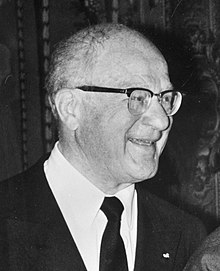Avery Brundage
| Avery Brundage | |
|---|---|
 |
|
 |
|
| 5th President of the International Olympic Committee | |
|
In office August 15, 1952 – September 11, 1972 |
|
| Preceded by | Sigfrid Edström |
| Succeeded by | Lord Killanin |
| Life Honorary President of the International Olympic Committee | |
|
In office September 11, 1972 – May 8, 1975 |
|
| Preceded by | vacant, last holder Sigfrid Edström (1964) |
| Succeeded by | vacant, next holder Lord Killanin (1980) |
| First Vice President of the International Olympic Committee | |
|
In office 1946–1952 |
|
| Preceded by | Sigfrid Edström (from 1942 to 1946 acting as president) |
| Succeeded by | Armand Massard |
| Second Vice President of the International Olympic Committee | |
|
In office 1945–1946 |
|
| Preceded by | office created |
| Succeeded by | vacant, next holder Lord Burghley (1954) |
| Member of the International Olympic Committee | |
|
In office July 30, 1936 – September 11, 1972 |
|
| Preceded by | Ernest Lee Jahncke |
| President of the United States Olympic Committee | |
|
In office 1928–1953 |
|
| Preceded by | Douglas MacArthur |
| Succeeded by | Kenneth L. Wilson |
| Personal details | |
| Born |
September 28, 1887 Detroit, Michigan, United States |
| Died | May 8, 1975 (aged 87) Garmisch-Partenkirchen, West Germany |
| Resting place | Rosehill Cemetery, Chicago, Illinois, United States |
| Nationality | American |
| Spouse(s) |
|
| Children |
|
| Residence |
|
| Alma mater | University of Illinois |
| Profession | Civil engineer, general contractor |
| Signature |  |
Avery Brundage (/ˈeɪvri ˈbrʌndᵻdʒ/; September 28, 1887 – May 8, 1975) was the fifth president of the International Olympic Committee (IOC), serving from 1952 to 1972. The only American to attain that position, Brundage is remembered as a zealous advocate of amateurism and for his involvement with the 1936 and 1972 Summer Olympics, both held in Germany.
Brundage was born in Detroit in 1887 to a working class family; when he was five years old, his father moved his family to Chicago and subsequently abandoned his wife and children. Raised mostly by relatives, he attended the University of Illinois to study engineering and became a track star. In 1912, he competed in the Summer Olympics, contesting the pentathlon and decathlon, but did not win any medals; both events were won by Jim Thorpe. He won national championships in track three times between 1914 and 1918, and founded his own construction business. He earned his wealth from this company and from investments, and never accepted pay for his sports involvement.
Following his retirement from athletics, Brundage became a sports administrator, rising rapidly through the ranks in United States sports groups. As leader of America's Olympic organizations, he fought zealously against a boycott of the 1936 Summer Olympics, which had been awarded to Germany before the rise of its Nazi government and its subsequent, escalating persecution of Jews. Although Brundage was successful in getting a team to the Games in Berlin, its participation was controversial and has remained so. Brundage was elected to the IOC that year, and quickly became a major figure in the Olympic movement. He was elected IOC president in 1952.
...
Wikipedia
